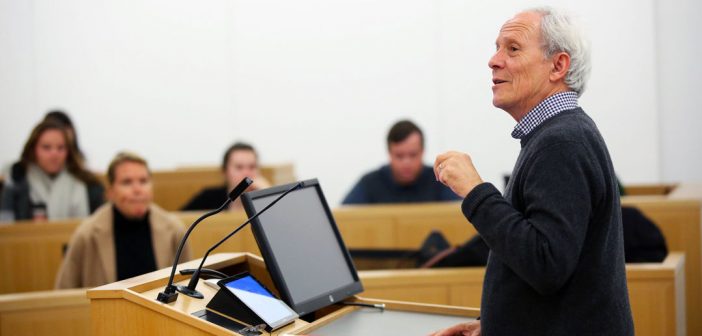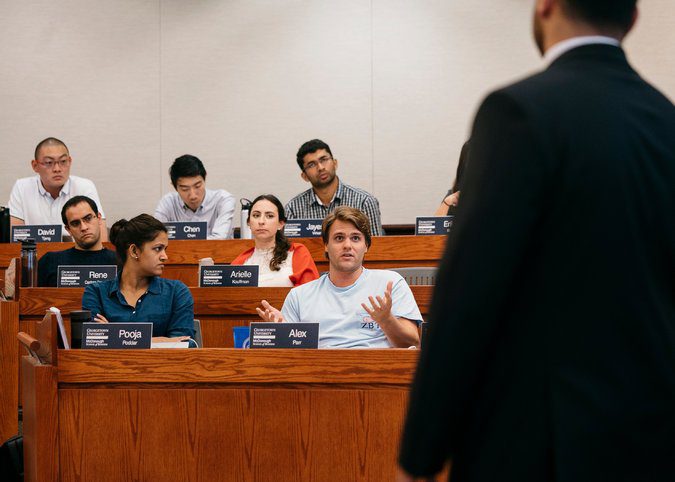NJ Monthly Mag Highlights Rutgers EMBA Doctors, and More – New York City News

Let’s explore some of the most interesting stories that have emerged from New York City business schools this week.
NJ Monthly Mag Highlights Rutgers EMBA Doctors – Rutgers Business Blog
According to stats released by Rutgers Business School, it’s not uncommon to find between 1-5 doctors in a typical EMBA class. This is largely due to the new reality of the medical profession, which has increasingly required that doctors “transition from medical practice to running hospitals, managing hospital finances, heading-up HMOs, working for pharmaceutical companies and becoming Chief Medical Officers.”
Three Rutgers EMBA Doctors made New Jersey Monthly Magazine’s annual “Top Doctors” list:
- Clifford Sales, a vascular surgery specialist at Overlook Medical Center
- Eric Seaman, a male infertility specialist at the Urology Group of New Jersey
- Jacqueline Williams-Phillips, the medical director of the Pediatric Intensive Care Unit at Bristol-Myers Squibb Children’s Hospital at Robert Wood Johnson University Hospital in New Brunswick and associate professor of Pediatrics at UMDNJ-Robert Wood Johnson Medical School.
Learn more about these EMBA Superstar Doctors here.
Patagonia Exec Talks ‘Fast Fashion,’ Fair Trade, and What It Means to Be A Responsible Company – Gabelli Connect
The Gabelli School of Business‘ Center for Humanistic Management recently hosted a guest lecture from Vincent Stanley, the Patagonia director of philosophy, in which he talked about how corporate responsibility has directly shaped the company’s business.
“One of our big concerns is how we look at the challenges of the planet and ensure that our company is not contributing to those challenges and instead contributing to the solutions. Nature is not just where we go to play. The health of our natural systems underlines all of our social and industrial systems, even in this tiny little town where we were based.”

Vincent Stanley, Patagonia director of philosophy / Photo via fordham.edu
You can read more about Stanley’s lecture here.
Can Stevens Students Create a Cryptocurrency Exchange? Bank on It – Stevens Institute of Technology SOB Blog
A team of Stevens Institute of Technology School of Business seniors recently announced its plans to unveil Coin Complex, a cryptocurrency exchange designed to address and improve upon the limitations of the current trading options, at the May 2 Innovation Expo. George Engroff, a senior finance major who recently completed a summer internship with Credit Suisse, elaborates: “The exchanges I was using were completely inadequate—none of them gave you a good understanding of the market and your portfolio. So I thought, here at Stevens, we have a lot of smart people and innovators—I’m sure we could make a better exchange than what’s out there.”

The Coin Complex login / Photo via Tom Braunck
You can find out more about Coin Complex here.
An Inside Look at UCLA Anderson Impact Week 2018

Five years ago, UCLA Anderson students, professors, and alumni first got together for a week-long conference about creating positive social change. Now, Impact Week is an annual event that features talks and workshops from some of the world’s leading business experts examining what the future will hold, particularly as it relates to having a positive impact.
The goal of the Impact Week conference is to help attendees rethink the role of social impact—it’s not just for non-profit organizations. Instead, attendees will be introduced to many different ways that for-profit businesses can make an impact across industries. To make this possible, the event brings in many top business leaders with experience all over the board. Some of this year’s speaker’s include:
- Cara Chacon, VP of social & environmental responsibility at Patagonia
- Chuck Lee, director of insights at Buzzfeed Entertainment Group
- Darya Allen-Attar, financial advisor at Morgan Stanley Wealth Management
- Les Borsai, founder and CEO of Gridmob
- Jennifer Vaden Barth, program manager, CS education in media at Google
This year’s conference will start on April 9th and run through April 13, and will feature workshops, panels, screenings, network mixers, receptions, and more. Each event held during the week covers a different topic. Taken together they are intended to provide a full overview of social impact. Topics to be covered include:
- Impact Investing
- How Profit is Possible in the Affordable Housing Space
- Impact in Media and Entertainment
- How to Drive Impact Through Design
- Impact on the Blockchain
- Diversity & Inclusion in Tech
Most days, the conference holds an event over lunch from 11:30 a.m. until 12:30 or 1 p.m. The remaining events for each day then typically take place after 5 p.m., so that attendees can join after work. Anyone and everyone is welcome at Impact Week, including MBA students, students from the greater UCLA community, professionals outside of UCLA, and more.
The cost to attend is $20 for the week, plus $5 per event. To learn more about the conference and to purchase your tickets, click here.
This article has been edited and republished with permissions from our sister site, Clear Admit.
Top Schools Tackle Sexual Harassment, NFL Protests, and More

Should business schools teach ethics and social responsibility? In the past, top MBA programs stuck to a fairly typical curriculum: finance, marketing, accounting, economics. And while those topics still comprise the core of most MBA programs, they’re now only a part of the whole.
Beyond allowing MBA students to focus their studies in areas like entrepreneurship or technology, MBA programs are also taking on some of the most prominent ethical topics of the day, asking students to weigh in on current headlines and happenings. It’s the MBA ethics debate.
According to a United Nations group survey of business school students from around the world, students believe that ethics are a business’s most important responsibility. According to the report, “the exposure to, and teaching of, business ethics does not merely assist business leaders to resolve moral dilemmas. More importantly, it matures their proficiency in moral judgment and their ability to incorporate social issues in the decision-making process and assists them in implementing this in an all-inclusive manner.”
For example, last year a group of business executives—including the CEO of PepsiCo and head of General Motors—got together to dissolve two business councils that consulted with President Trump after insensitive remarks about the white supremacist violence that took place in Charlottesville, VA. And other executives such as the CEO of Patagonia, Yvon Choinard, have been vocal about political and ethical issues—even using their companies to take positions on social responsibility that would typically be considered outside the scope of business.
So, it’s no wonder many business schools have been making business ethics a more important part of their curriculum. The question is, “How should business ethics be added to the MBA curriculum, and how is it being added currently?” It depends on the school.
At Georgetown University’s McDonough School of Business, Professor Edward Soule teaches courses on business ethics, corporate social responsibility, and leadership. During these classes, he told the New York Times that he has assigned coursework covering a range of trending topics including sexual harassment at Uber, social justice protests by N.F.L. players, and how companies like Amazon have responded when attacked by President Trump.
“Something has changed,” Soule said. “I would be kidding you if I told you there wasn’t a different vibe in the classroom. Ethics and values have taken on more significance. It has to do with all of the things going on in this administration, often things that challenge our understanding of ethics and leadership.”

Students discuss the recent NFL protests in Prof. Ed Soule’s class at Georgetown’s McDonough School of Business. Photo via Justin T. Gellerson for The New York Times.
Georgetown McDonough is also home to the Institute for the Study of Markets and Ethics (GISME), a center that examines the ethical issues inherent in the functioning of a market society. Students, faculty, and researchers who participate in the center explore ethical questions as they relate to business and bring ethical considerations to bear on policy decisions regarding the regulation of markets. These are especially salient issues for Georgetown McDonough given its Washington D.C. location.
“At the McDonough School of Business, we have developed a method of teaching business ethics that includes normative experiential learning, communicates in terms readily understood by business students, and involves actual ethical decision-making on the part of the students,” Michael Douma, assistant research professor and director of GISME, said in a news release. “We have found that our approach results in students being more invested in the course and more committed to resolving ethical issues that confront them in a business environment.”
Another example can be found at Carnegie Mellon’s Tepper School of Business. According to John Hooker, a professor of operations research and business ethics and social responsibility, ethics has been a part of the Tepper School curriculum since the 1990s. “Our program was apparently the first to introduce the topic (1966), as part of a course on business law,” Hooker told us. “The ethics presence has gradually increased over the years, but we ethics faculty often have to fight for it. My view is that a required ethics course should be part of the picture.”
And Leanne Meyer, co-director of the Accelerate Leadership Center at the school, told the New York Times, “There’s a turning point in what’s expected from business leaders. Up until now, business leaders were largely responsible for delivering products. Now, shareholders are looking to corporate leaders to make statements on what would traditionally have been social justice or moral issues.”
As for ethics and MBA students, Tepper’s core offering in Ethics and Leadership is one of the only second-year courses it requires its students to take. The course teaches students how to foster their ability to reason and how to handle the ethical implications of managing organizations and people.
“The basic lesson for MBA students is that business ethics is not optional,” explained Hooker. “It is the basis for the social infrastructure that makes business possible, much as engineering is the basis for physical infrastructure. It requires careful analysis and training, no less than engineering or finance. This is why we need a stand-alone ethics course. Business ethics training teaches us to do ethics with our brains rather than rely on gut feelings. Otherwise, we have no way to reach consensus on the ground rules.”
In the end, there are many options for MBA students interested in ethics, though ultimately it up to the students themselves to raise topics that are pressing to them. “Ethics courses often focus on the hot topics. This stimulates discussion and raises course ratings, but it generates more heat than light,” said Hooker. “I focus on issues that students themselves raise. I also emphasize cross-cultural ethics, because business is global, and norms vary enormously around in the world. U.S. students typically have little awareness of this.”
Whether through case studies, guest speakers, simulations, competitions, or another initiative, the leading MBA programs dive into business ethics and corporate responsibility using a range of approaches. To learn more about Professor Hooker’s approach to ethics, you can check out his blog: Ethical Decisions.
